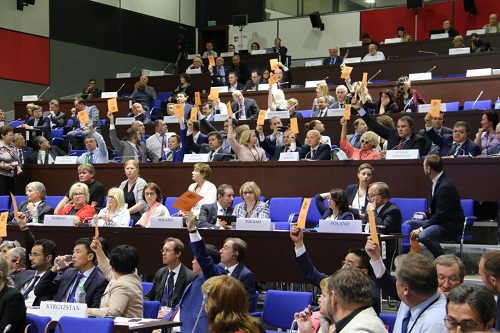
Voting on resolutions at the Plenary Session of OSCE PA Annual Session in Minsk, July 9, 2017. Photo: OSCE PA
The OSCE Parliamentary Assembly’s annual session in Minsk adopted on July 9 a final declaration, containing more than dozen of non-binding resolutions on broad range of issues with Georgia raised in one of the resolutions.
In the Political Affairs and Security Committee resolution on peace and prosperity in the OSCE region, the OSCE Parliamentary Assembly voiced its regret over “the lack of progress towards a peaceful resolution of the conflict in Georgia based on the norms and principles of international law,” and expressed concern “over the humanitarian and security situation in occupied Abkhazia, Georgia, and Tskhinvali region/South Ossetia, Georgia.”
The resolution also called for “the full implementation” of the EU-brokered Six-Point Ceasefire Agreement of August 12, 2008, “which ended the conflicts in Abkhazia, Georgia and Tskhinvali region/South Ossetia, Georgia,” as well as for “the free access of humanitarian aid” into the regions.
Georgia featured in the report for the OSCE PA’s Political Affairs and Security Committee as well. Authored by the Swedish lawmaker Margareta Cederfelt, the report said that the OSCE PA “needs to strengthen its political involvement to address the consequences of the August 2008 conflict between the Russian Federation and the territory of Georgia.”
“Russia should implement the EU-brokered Six-Point Ceasefire Agreement of 12 August 2008 which ended the conflicts in Abkhazia and the Tskhinvali region/South Ossetia and refrain from using and withdraw its military forces in order to create conditions for a peaceful resolution of the conflict,” the document reads.
According to the report, “parliamentary diplomacy should enhance confidence-building between both sides and create an atmosphere of co-operation and mutual trust.”
“However, we reject the holding of parliamentary elections in Abkhazia and the approval of a military deal between South Ossetia and the Russian Federation. Unilateral decisions such as holding Presidential elections in South Ossetia and changing the name of the region, as well as the opening of a Russian Embassy in Abkhazia, undermine the peace process on the territory of Georgia,” it added.
The issue of conflicts in Georgia was raised in number of other resolutions adopted previously by the OSCE Parliamentary Assembly, including in its Tbilisi Declaration in 2016.
The Assembly is the parliamentary dimension of the OSCE with 323 lawmakers from the organization’s 57 participating states, including Russia.
This post is also available in: ქართული (Georgian) Русский (Russian)
